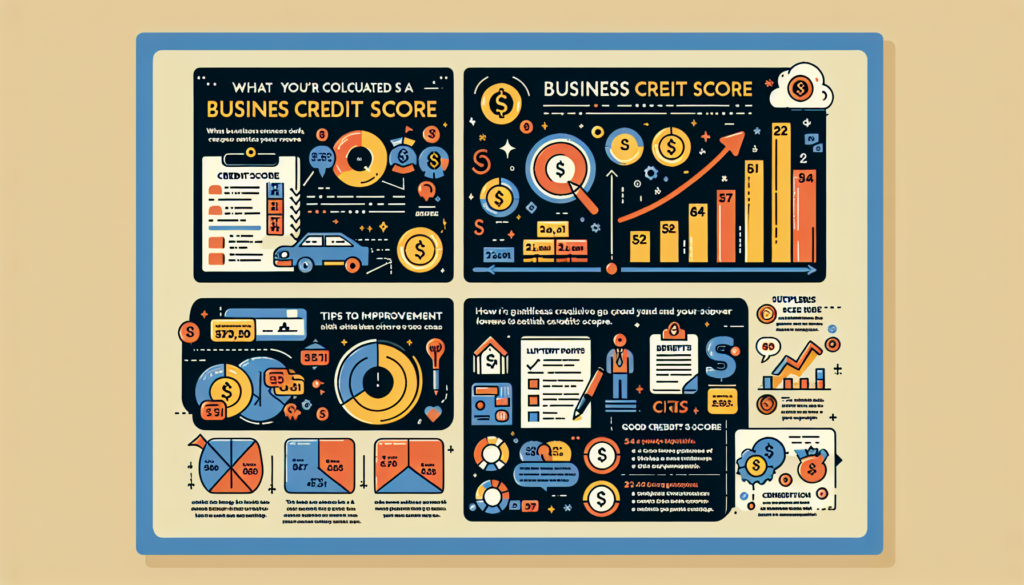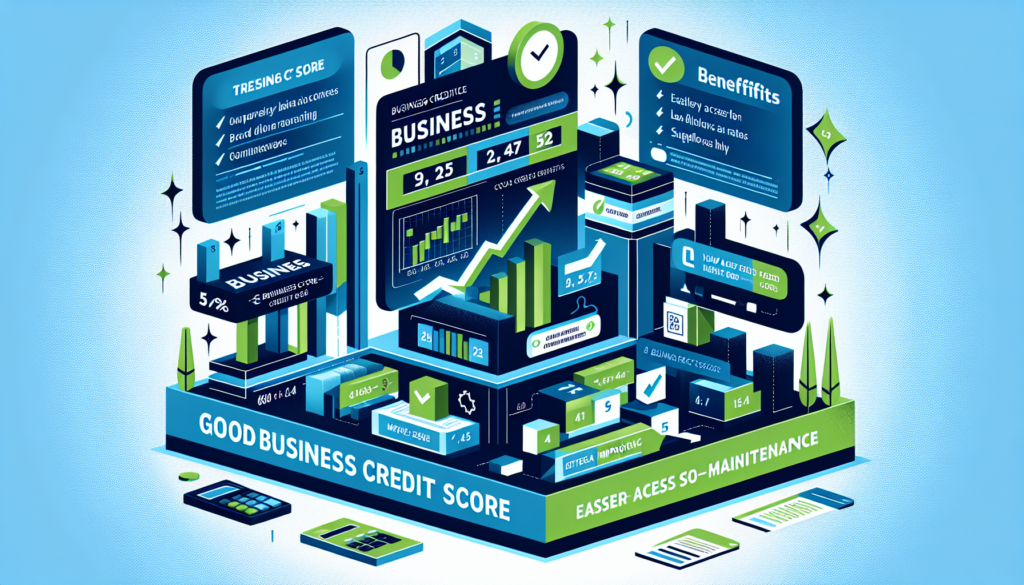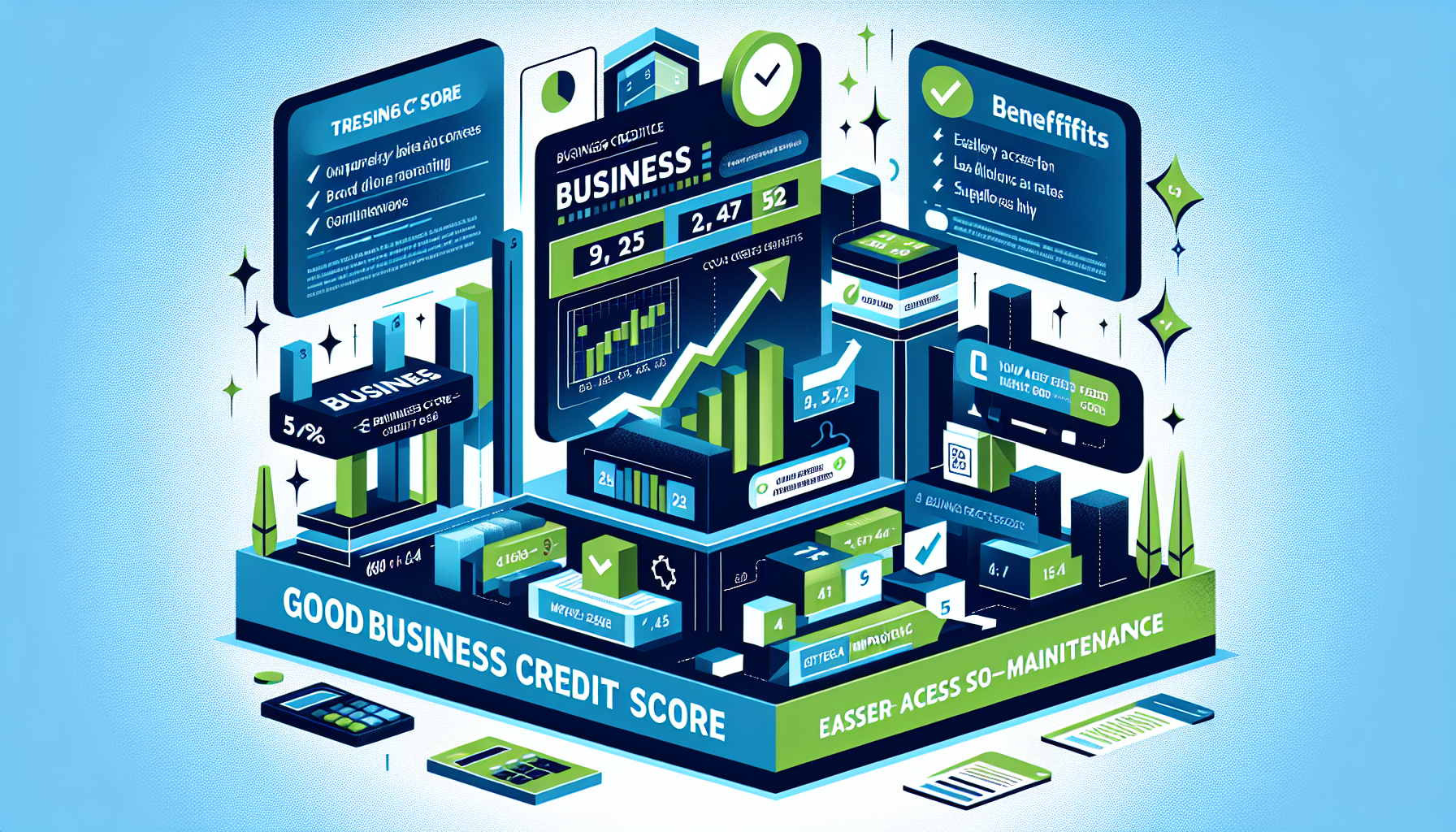If you’re a business owner, you’re no stranger to the importance of credit scores. But what about your business credit score? It’s a vital number that can profoundly impact your company’s financial stability and growth opportunities. In this article, we’ll explore the significance of a good business credit score, uncover the factors that contribute to it, and provide valuable insights on how you can improve and maintain a high score for your business’s success. So, buckle up and get ready to unlock the secrets of a strong business credit standing.

Understanding Business Credit Scores
What is a Business Credit Score?
A business credit score is a numerical representation of a company’s creditworthiness. It is used by lenders, suppliers, and other business partners to assess the financial health and reliability of a company. Just like individuals have personal credit scores, businesses have separate credit scores that reflect their credit history and financial behavior.
Importance of a Business Credit Score
Having a good business credit score is crucial for the growth and success of any company. It enables businesses to establish credibility, demonstrate financial responsibility, and build trust with lenders and suppliers. A strong business credit score can open doors to better loan options, lower interest rates, and increased business opportunities.
Factors Affecting Business Credit Scores
Payment History
One of the most significant factors affecting a business credit score is the payment history. Consistently making on-time payments to vendors, lenders, and other creditors demonstrates a company’s reliability and financial responsibility. Late or missed payments can have a negative impact on the credit score, making it essential for businesses to manage their payment obligations diligently.
Credit Utilization
Credit utilization refers to the amount of available credit a company is using. Keeping credit utilization low, typically below 30% of the credit limit, can positively impact a business credit score. High credit utilization can indicate a higher risk of default, leading to a lower credit score. Businesses should aim to use credit responsibly and avoid maxing out credit lines.
Credit History Length
The length of a business’s credit history also plays a role in determining its credit score. A longer credit history demonstrates stability and a proven track record of managing credit. Newer businesses may have shorter credit histories, which can put them at a disadvantage when it comes to credit scores. It is essential to establish credit as early as possible and maintain a positive credit history over time.
Public Records
Public records, such as bankruptcies, tax liens, and judgments, can significantly impact a business credit score. Negative public records can stay on a company’s credit report for several years and signal financial instability. It is crucial to address any public records promptly and work towards resolving them to minimize their impact on the credit score.
Credit Mix
The variety of credit types a business has also influences its credit score. A healthy credit mix that includes revolving credit (such as credit cards) and installment credit (such as loans) can demonstrate a business’s ability to manage different types of credit responsibly. Having a diverse credit portfolio can positively impact a credit score and show lenders that a business can handle various financial obligations.
Ranges and Scales of Business Credit Scores
Different Credit Bureaus
Various credit bureaus, such as Dun & Bradstreet, Experian, and Equifax, calculate business credit scores using their proprietary algorithms. Each credit bureau may have slightly different scoring models and credit score ranges. It is essential for businesses to understand which credit bureau’s scores are being used by their potential partners or lenders to better manage their creditworthiness.
FICO SBSS Score Range
The FICO Small Business Scoring Service (SBSS) score is one commonly used credit scoring model. It provides lenders with an assessment of a business’s creditworthiness and helps them make lending decisions. The FICO SBSS score ranges from 0 to 300, with a higher score indicating a lower credit risk and greater likelihood of loan approval.

Why Does a Good Business Credit Score Matter?
Access to Loans and Financing
A good business credit score is key to accessing loans and financing options that can fuel a company’s growth. Lenders often use credit scores as a primary factor in determining loan eligibility and interest rates. A higher credit score increases the likelihood of loan approval and can result in more favorable lending terms, including higher loan limits and lower interest rates.
Lower Interest Rates
A good credit score can lead to lower interest rates on loans and lines of credit. Lenders consider businesses with higher credit scores as less risky borrowers, and therefore offer them lower rates to incentivize borrowing. This translates to significant cost savings for businesses over the repayment term of their loans or financing arrangements.
Business Opportunities
A strong business credit score opens up a world of opportunities for a company. It can attract more favorable business partnerships, secure better terms with suppliers, and increase the likelihood of being approved for contracts and leases. A positive credit history and high credit score signal reliability and financial stability, making businesses more attractive to potential partners and stakeholders.
How to Check and Monitor Your Business Credit Scores
Obtaining Your Business Credit Report
To check your business credit score, start by obtaining a copy of your business credit report from one or more credit bureaus. Some credit bureaus offer free annual reports, while others may charge a nominal fee for access. Review your report carefully, ensuring that all information is accurate and up-to-date. Disputing any errors promptly can help maintain an accurate reflection of your creditworthiness.
Monitoring Your Business Credit Scores
Regularly monitoring your business credit scores is crucial for staying informed about your creditworthiness. Several credit monitoring services provide ongoing access to your credit scores, alerting you to any significant changes or potential issues. Monitoring your scores allows you to promptly address any negative changes and take proactive steps to improve your creditworthiness.
Improving Your Business Credit Score
Prompt Payments
Consistently making on-time payments is one of the most effective ways to improve your business credit score. Set reminders or automate payments to ensure that obligations to vendors and lenders are met promptly. Regularly monitoring your payment history and addressing any missed or late payments can help rectify any negative impact on your credit score.
Managing Credit Utilization
To improve your business credit score, aim to keep your credit utilization low. Avoid maxing out credit lines and try to keep utilization below 30% of the available credit limit. If possible, pay down balances in full each month to demonstrate responsible credit utilization.
Maintaining a Strong Credit History
Maintaining a strong credit history is essential for a good business credit score. Establish a track record of responsible borrowing and payment behavior over time. Regularly using and repaying credit helps build a favorable credit history and positively impacts your credit score.
Addressing Public Records
Address any public records on your credit report promptly. If there are bankruptcies, tax liens, or other negative public records, work towards resolving them and minimizing their impact on your credit score. It may take time and effort, but addressing public records can improve your creditworthiness in the long run.
Diversifying Credit
Having a diverse credit portfolio can positively impact your business credit score. Seek a mix of different credit types, such as credit cards, lines of credit, and loans. Managing multiple forms of credit responsibly shows lenders your ability to handle different financial obligations and can improve your credit score.
Common Myths About Business Credit Scores
Businesses Don’t Have Credit Scores
Contrary to popular belief, businesses do have credit scores. Just like individuals, businesses are assessed based on their creditworthiness and financial behavior. Building and maintaining a strong business credit score is vital for business success.
Personal Credit Score Affects Business Credit Score
While personal credit can sometimes impact a business’s creditworthiness, it does not directly affect the business credit score. However, certain lenders and creditors may consider an owner’s personal credit history when evaluating business creditworthiness. Separating personal and business finances is essential to maintain a healthy business credit score.
Business Credit Scores Never Change
Business credit scores can change over time as businesses’ financial behavior and credit obligations evolve. Positive actions, such as making prompt payments and maintaining a strong credit history, can positively impact the credit score. On the other hand, negative behavior, such as late payments or public records, can lower the credit score. It is important to actively manage and monitor your business credit to ensure its continuous improvement.
Using Business Credit Scores Wisely
Using Credit Conservatively
Using credit conservatively and responsibly is key to maintaining a good business credit score. Avoid taking on excessive debt and only borrow what you need and can comfortably repay. Responsible credit utilization demonstrates financial discipline and enhances your creditworthiness.
Building Strong Relationships with Suppliers
Establishing strong relationships with suppliers is not only beneficial for day-to-day operations but can also impact your creditworthiness. Timely payments and reliable business practices can lead to favorable credit terms with suppliers, helping you manage cash flow and build a positive credit history.
Reviewing Credit Terms
Reviewing credit terms from lenders and creditors is crucial to ensure you understand the terms and conditions of borrowing. Carefully review interest rates, repayment terms, and any additional fees or charges associated with credit. Understanding the terms will help you make informed borrowing decisions and manage credit responsibly.
Preventing Fraud and Identity Theft
Protecting your business’s financial information and credit accounts is essential to maintaining a good credit score. Implement strong security measures, regularly monitor your accounts for any suspicious activity, and report any potential fraud or identity theft immediately. Taking proactive steps to safeguard your business’s creditworthiness can save you from significant financial and reputational harm.
Legal Protections for Business Credit Reports
Fair Credit Reporting Act (FCRA)
The Fair Credit Reporting Act (FCRA) is a federal law that promotes the accuracy, fairness, and privacy of consumer information, including business credit reports. It establishes guidelines for how businesses can access and use credit information and provides consumers with rights to dispute inaccurate information. Familiarize yourself with the FCRA to understand your rights and protections regarding your business credit report.
Challenging Inaccurate Information
If you believe there is inaccurate information on your business credit report, you have the right to dispute it. Contact the credit bureau responsible for the report and provide documentation to support your claim. The credit bureau must investigate the dispute and correct any inaccuracies within a reasonable timeframe. Challenging inaccurate information can help ensure the accuracy and fairness of your business credit score.
Conclusion
Understanding and managing your business credit score is crucial for the success of your company. A good business credit score provides access to loans, favorable interest rates, and valuable business opportunities. By focusing on factors such as payment history, credit utilization, credit mix, and maintaining a strong credit history, you can improve your creditworthiness and reap the benefits of a good business credit score. Regularly monitoring your credit scores and taking proactive steps to address any issues will help ensure the accuracy and fairness of your business credit report.

